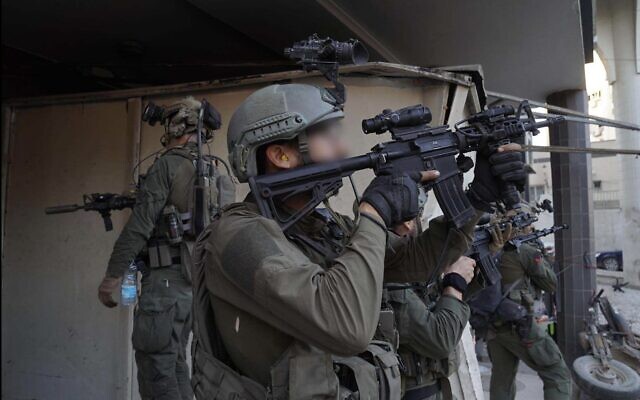OPINION: What happens when Israel’s military and government arms aren’t shaking hands?
The war with Hamas has demonstrated the importance of aligning military operations with political objectives
The Hamas war has exposed the failures typical of the relationship between the government and the army. This time, the terrible cost of these failures requires an investigation by a State Commission of Inquiry, the highest level of investigatory bodies in Israel – and with the broadest powers. It should be assembled and convened not only to look into the failures that led to the October 7 disaster, but also to investigate the subsequent failures in managing the war that followed.
Governments tend to define goals with vague language, but the military echelon requires precision to enable force deployment in the scope, method, and duration required to achieve its goals. Following the October 7 massacre, the Israeli government ordered the IDF to destroy Hamas’s governing and military capabilities and to bring the hostages back home.
The political echelon, as usual, avoided a clear prioritisation of the war’s specific goals and ignored the internal contradictions that invariably emerge when trying to achieve multiple objectives at the same time. For example, the government disregarded the fundamental fact that to release the hostages, negotiations must be conducted with their captors and their leadership; therefore, they must be left alive until the abducted are returned to Israeli soil.
The head of the National Security Council, Tzachi Hanegbi, was unusually candid in addressing this contradiction: “We currently have no way to conduct negotiations with an enemy we want to wipe off the face of the earth (October 14, 2023).”
Hanegbi’s fellow politicians chose to resolve the dilemma by repeating the unproven mantra that only increased military pressure on Hamas could bring about the release of the hostages. Sadly, the IDF has embraced the politicians’ slogans without evincing the military logic behind an argument better suited to politicians without much public courage.
The IDF’s chief of staff and its military leaders are experienced in dealing with the political realm and are quite familiar with the tendency of the heads of government to impose upon them directives that come with a wink. This calculated strategy of politicians is aimed at affording them “plausible deniability” in anticipation of future inquiries, thereby shielding them from accountability for the military’s implementation of their directives. Hence, the chief of staff and his team shouldn’t be caught off guard when politicians fail to accurately define goals and priorities.
As custodians of our soldiers’ lives, it’s the chief of staff’s supreme duty to demand explication of any aspect of an order that isn’t crystal clear before it’s executed.
American General Norman Schwarzkopf, charged with ousting the Iraqi occupiers from Kuwait in 1991, stressed the importance of the White House providing explicit and unambiguous clarity on the war’s purpose. He emphasised the necessity of demonstrating the mission’s feasibility, ensuring adequate resources – including international legitimacy – and formulating a clear exit strategy.
Schwarzkopf, drawing from the lessons of the Vietnam War, also insisted on securing the government’s commitment that the military would not face limitations on the use of its power to achieve its designated objectives.
The investigative body that will inevitably deal with the war that followed the terrible failures of October 7, must scrutinise the extent to which the chief of staff pressed the government for clarity on the operational nuances of any vague directive imposed upon him.
It should evaluate whether the chief of staff and his team adequately scrutinised the assigned tasks, assessed their operational implications, and formulated pertinent questions requiring government responses before engaging in battle.
For example, did the army layout for the government any contradictions inherent in the goals set and demand that the hierarchy of the various goals be explicitly stated? In this context, it’s imperative to examine whether the minister of defence facilitated eliciting the political echelon’s responses to military queries, and if he actively pursued clarification of vague directives.

American General David Petraeus, who successfully led the fight against al-Qaeda, and drew lessons from US failures in Afghanistan and Iraq, publicly warned before the IDF’s Gaza incursion began that “there needs to be a vision that will define who will manage Gaza after the dismantling of the political arm of Hamas.”
He went on to say, “there is no realistic alternative but for Israel to do this for a certain period of time,” and that, of course, “there needs to be a clear vision about the day after.” Petraeus and others warned that if the IDF leaves a specific area it has conquered, Hamas will return to it.
Did the chief of staff make it clear to the government, and demand its approval, that in order to bring down Hamas, both its military and governing arms, the entire Gaza Strip must be occupied and held for a long period of time? That it would require replacing the Hamas civilian government system with an Israeli military government? Was the cabinet warned by the intelligence agencies that without asserting an Israeli commitment to some political horizon for the future of the Gaza Strip, it would be difficult to find a party to replace the IDF when the time comes?
Indeed, recent reports have shed light on senior IDF officers expressing frustration over the failure to translate tactical successes into strategic gains. They emphasize the importance of aligning military operations with political objectives, stressing that “there is a necessity to adapt the military act to the political act”.
This wise observation echoes Clausewitz’s insights from two centuries ago. It’s just sad that so many months passed before such an elementary strategic truth was recognized by the army. How long will we have to wait until this truth penetrates the government’s deliberations as well?
- Avi Gil is a former director-general of the Ministry of Foreign Affairs, and a senior fellow at the Jewish People Policy Institute (JPPI). His new book “Where is the Head” will be published in the coming weeks by Steimatzky.

Thank you for helping to make Jewish News the leading source of news and opinion for the UK Jewish community. Today we're asking for your invaluable help to continue putting our community first in everything we do.
For as little as £5 a month you can help sustain the vital work we do in celebrating and standing up for Jewish life in Britain.
Jewish News holds our community together and keeps us connected. Like a synagogue, it’s where people turn to feel part of something bigger. It also proudly shows the rest of Britain the vibrancy and rich culture of modern Jewish life.
You can make a quick and easy one-off or monthly contribution of £5, £10, £20 or any other sum you’re comfortable with.
100% of your donation will help us continue celebrating our community, in all its dynamic diversity...
Engaging
Being a community platform means so much more than producing a newspaper and website. One of our proudest roles is media partnering with our invaluable charities to amplify the outstanding work they do to help us all.
Celebrating
There’s no shortage of oys in the world but Jewish News takes every opportunity to celebrate the joys too, through projects like Night of Heroes, 40 Under 40 and other compelling countdowns that make the community kvell with pride.
Pioneering
In the first collaboration between media outlets from different faiths, Jewish News worked with British Muslim TV and Church Times to produce a list of young activists leading the way on interfaith understanding.
Campaigning
Royal Mail issued a stamp honouring Holocaust hero Sir Nicholas Winton after a Jewish News campaign attracted more than 100,000 backers. Jewish Newsalso produces special editions of the paper highlighting pressing issues including mental health and Holocaust remembrance.
Easy access
In an age when news is readily accessible, Jewish News provides high-quality content free online and offline, removing any financial barriers to connecting people.
Voice of our community to wider society
The Jewish News team regularly appears on TV, radio and on the pages of the national press to comment on stories about the Jewish community. Easy access to the paper on the streets of London also means Jewish News provides an invaluable window into the community for the country at large.
We hope you agree all this is worth preserving.






















